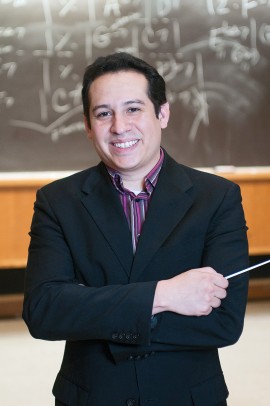José Riojas creates connections through conducting

“Even as a pre-teen and teenager, I recall being in constant thought at how I could find ways of making music,” says José Riojas. Photo: Joshua Clark/UIC Photo Services
José Riojas, UIC’s new director of bands, does more than conduct his musicians — he writes music for them.
And his latest composition is getting national attention.
“Veracruz!”, an “incredibly stylized piece” for saxophone quartet, “is a collection of Mexican folk songs played like Mexican musicians would’ve played it, translated for saxophone,” Riojas said.
The piece, published in January, was performed by finalists in the 2014 Fischoff National Chamber Music Competition at the University of Notre Dame, one of the nation’s best-known competitions.
As another indication of its powerful appeal, “Veracruz!” will be recorded by the New Century Saxophone Quartet for its next CD.
“It’s the most widely performed piece I’ve written,” said Riojas, an arranger, transcriber and composer who has received commissions from four continents.
An assistant professor of music who joined the university last August, he conducts the UIC Wind Ensemble and oversees the UIC University Band and UIC Pep Band. He works closely with Nicholas Carlson, assistant director of bands.
One change Riojas initiated is the establishment of a second concert band.
“The problem with the [existing] band was that it sort of alienated the student who wants to come and play for fun,” he said.
Members of the new band meet every Monday night. Like the more established group, it has 60 members.
“They are either not music majors or minors, or they may play a secondary instrument — someone who usually plays a saxophone, plays a bass clarinet,” Riojas said.
A summer program, set for the last week in July, is the UIC Symphonic Band Camp for high school students. At the end of the week they’ll present a concert of the music they’ve been learning, along with the UIC Summer Wind Ensemble, directed by Carlson.
Riojas is looking forward to the last week of this month, when he conducts saxophone ensembles at Wildacres, a retreat hidden away in the Blue Ridge Mountains of North Carolina.
The largest ensemble will have 35 players. A second group, with 13 players, “performs the most difficult music and involves the strongest players and faculty,” he said. A third ensemble has 8 to 12 players.
“This is one of the most exciting things I do every year,” he said. “Playing music for that many saxophones is rare, and a privilege to do. Working with that level of artistry for that amount of time — you don’t usually get to do that.”
A big plus for the retreat is its setting. “It’s completely secluded from normal society,” said Riojas, who first attended the retreat in 2004 as a student. “It’s stress-free, no interruptions; you get to just concentrate.”
Riojas grew up in Eagle Pass, Texas, a small border town two-and-a-half hours southwest of San Antonio.
He earned a bachelor’s degree in music education from the University of Texas at San Antonio. At the University of Tennessee he got a master’s in wind conducting, with a secondary concentration in saxophone performance, then completed a doctorate in wind conducting, with a minor in music theory, from the University of Georgia.
Before coming to UIC, Riojas taught four years in the North East Independent School District in San Antonio, Texas. Each year his bands were awarded top scores and one took second place in the Texas Honor Band Competition.
Riojas and his wife, Priscilla, an executive in a restaurant business, live in Naperville with their daughter, Nadia, 6.
Music has been the driving force in his life since he started playing the saxophone at age 12.
“Even as a pre-teen and teenager, I recall being in constant thought at how I could find ways of making music,” Riojas said. “I believe we continue to strive to make music because we look for the special moments in which the music arrives somewhere — a place where the audience, conductor and musician all engage together in a connection through this music.
“A place where an emotional response is triggered and music has at that point taken you to a place that isn’t accessible on its own.
“A place you love and are in constant excitement to find again.”
